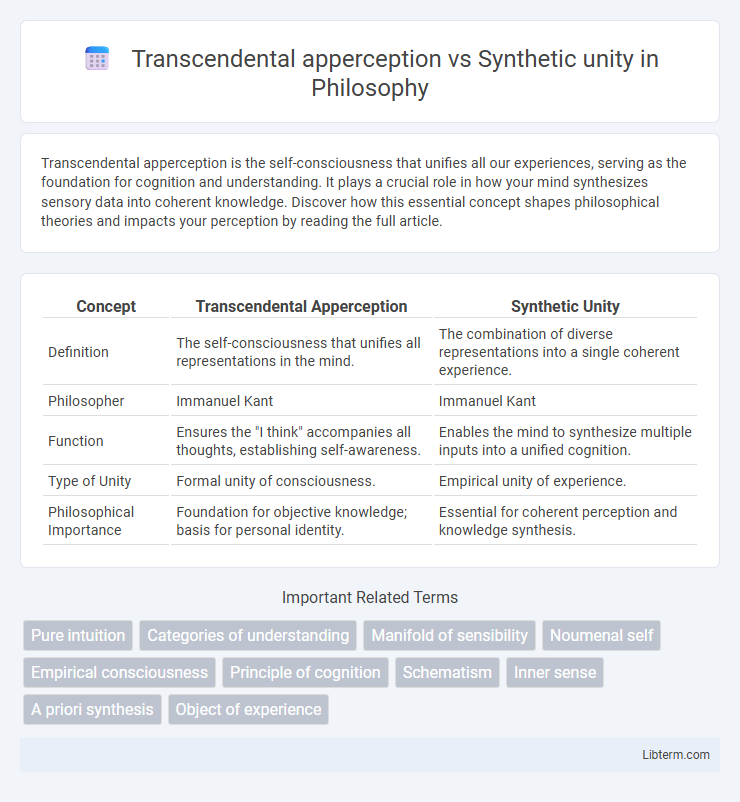Transcendental apperception is the self-consciousness that unifies all our experiences, serving as the foundation for cognition and understanding. It plays a crucial role in how your mind synthesizes sensory data into coherent knowledge. Discover how this essential concept shapes philosophical theories and impacts your perception by reading the full article.
Table of Comparison
| Concept | Transcendental Apperception | Synthetic Unity |
|---|---|---|
| Definition | The self-consciousness that unifies all representations in the mind. | The combination of diverse representations into a single coherent experience. |
| Philosopher | Immanuel Kant | Immanuel Kant |
| Function | Ensures the "I think" accompanies all thoughts, establishing self-awareness. | Enables the mind to synthesize multiple inputs into a unified cognition. |
| Type of Unity | Formal unity of consciousness. | Empirical unity of experience. |
| Philosophical Importance | Foundation for objective knowledge; basis for personal identity. | Essential for coherent perception and knowledge synthesis. |
Introduction to Transcendental Apperception and Synthetic Unity
Transcendental apperception refers to the self-consciousness that unifies all experiences, enabling the mind to recognize itself as the subject of thoughts and perceptions. Synthetic unity involves the active process by which the mind combines diverse sensory inputs into a coherent, singular experience, forming the basis of knowledge and cognition. Both concepts are foundational in Kantian philosophy, highlighting the necessary conditions for the possibility of experience and the structure of consciousness.
Historical Context in Kantian Philosophy
Transcendental apperception, introduced by Immanuel Kant in the "Critique of Pure Reason" (1781), refers to the self-consciousness that unifies all representations, forming the basis of personal identity and experience. Synthetic unity of apperception describes how diverse sensory data are combined into a single, coherent experience through the active role of the mind, enabling synthetic a priori judgments essential for knowledge. Historically, Kant's distinction addressed the epistemological challenges of empiricism and rationalism, establishing a framework where cognition actively structures reality rather than passively receiving it.
Defining Transcendental Apperception
Transcendental apperception is the self-consciousness that unifies all representations in the mind, serving as the foundational "I think" that must be able to accompany all experiences. It provides the essential condition for the possibility of experience by synthesizing diverse sensory inputs into a coherent, unified perception. Unlike the synthetic unity of apperception, which focuses on the active combination of representations, transcendental apperception emphasizes the underlying, pure self-awareness that makes synthesis possible.
Understanding Synthetic Unity of Apperception
The Synthetic Unity of Apperception refers to the mind's ability to combine diverse sensory inputs into a coherent, unified experience through active synthesis. It serves as the foundational mechanism in Kantian epistemology that allows for self-consciousness by integrating these representations under a single, continuous ego. This unified synthesis is essential for forming coherent judgments and is distinct from Transcendental Apperception, which emphasizes the pure, original self-awareness underlying all experience.
Key Differences Between the Two Concepts
Transcendental apperception refers to the self-conscious awareness that unifies all representations in the mind, functioning as the "I think" that accompanies all thoughts. Synthetic unity, on the other hand, involves the active combination of diverse sensory inputs and concepts into a coherent experience or judgment. The key difference lies in transcendental apperception's role as the foundational self-consciousness underpinning all cognition, whereas synthetic unity is the process of integrating multiple perceptions into a singular, unified consciousness.
The Role of Subjectivity in Cognition
Transcendental apperception refers to the self-consciousness that unifies diverse experiences, forming a coherent subjective identity in cognition. Synthetic unity involves the mind's active role in combining sensory data into organized knowledge, ensuring that perceptions are not disjointed but integrated under the subject's conceptual framework. Both concepts emphasize subjectivity's foundational role in structuring experience and enabling knowledge acquisition by the human mind.
Transcendental Apperception in Knowledge Formation
Transcendental apperception refers to the self-consciousness that unifies all representations in the process of knowledge formation, serving as the foundational "I think" that must accompany all experiences. This concept ensures that diverse sensory inputs are synthesized into a coherent, unified experience, enabling the mind to attribute knowledge to a single, consistent subject. In contrast to synthetic unity, which emphasizes the combination of various representations, transcendental apperception underscores the essential role of self-awareness in organizing and structuring knowledge.
Synthetic Unity and the Structure of Experience
Synthetic unity of apperception refers to the mind's ability to combine diverse sensory inputs into a coherent experience, forming the unified self-awareness necessary for cognition. This structure of experience hinges on the active synthesis performed by the understanding, which organizes intuitions under categories to produce meaningful knowledge. Unlike transcendental apperception as pure self-consciousness, synthetic unity emphasizes the integrative process that binds representations into a single, continuous experiential stream.
Philosophical Implications and Debates
Transcendental apperception, defined as the self-consciousness that unifies all representations into a coherent experience, anchors Immanuel Kant's epistemology by emphasizing the active role of the mind in constructing knowledge. Synthetic unity refers to the process by which diverse sensory inputs are combined into a single, meaningful cognition, highlighting the mind's capacity to synthesize disparate data into unified concepts. Philosophical debates center on whether transcendental apperception is a static, foundational self or a dynamic process, and how synthetic unity challenges empiricism by asserting innate structures shaping experience, thus influencing contemporary discussions in phenomenology and cognitive science.
Conclusion: Integrating Apperception and Unity in Modern Thought
Transcendental apperception emphasizes the self-conscious awareness underlying all cognition, while synthetic unity highlights the mind's ability to unify diverse experiences into coherent knowledge. Modern philosophy integrates these concepts by recognizing that apperception's self-reflective aspect is essential for the synthetic unity of experience, facilitating coherent subjectivity. This synthesis advances understanding of consciousness as both self-aware and integrative in nature, forming a foundational framework for cognitive science and epistemology.
Transcendental apperception Infographic

 libterm.com
libterm.com